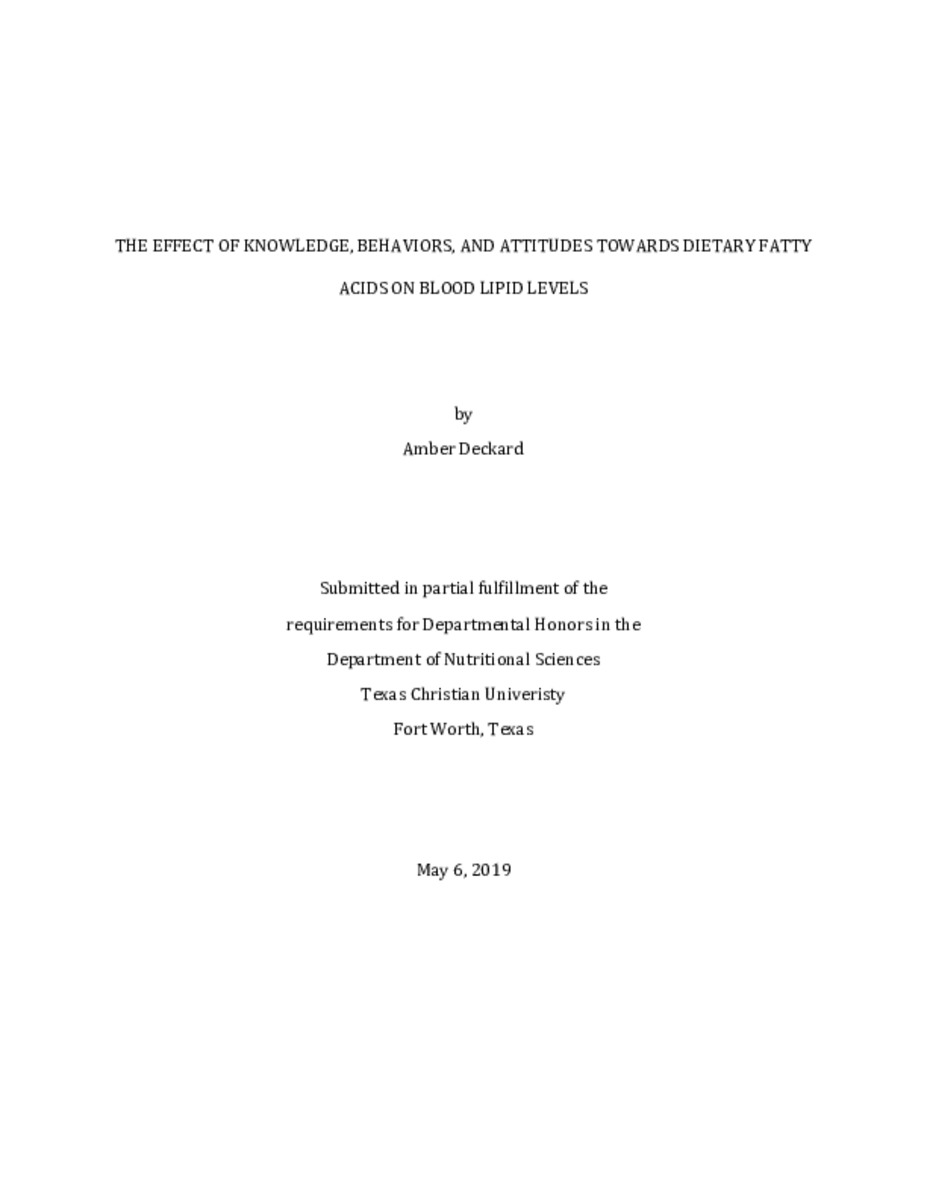The Effect of Knowledge, Behaviors, and Attitudes towards Dietary Fatty Acids has on Blood Lipid LevelsShow full item record
| Title | The Effect of Knowledge, Behaviors, and Attitudes towards Dietary Fatty Acids has on Blood Lipid Levels |
|---|---|
| Author | Deckard, Amber |
| Date | 2019 |
| Abstract | Background: Research has shown a strong relationship between dietary fatty acids (FAs) and their impact on blood cholesterol. Few studies have examined knowledge, behaviors and attitudes (KBA) towards dietary FAs impact blood lipid levels. Objective: To determine: 1) KBA of FAs using the modified General Nutrition Knowledge Questionnaire (GNKQ); and 2) correlations between anthropometric data, GNKQ responses, and blood lipid levels. Design: This study utilized a cross-sectional research design. Methods: Upon IRB approval, 104 women ages 18-40yr consented and completed the modified GNKQ via Qualtrics®. The GNKQ consisted of 70 questions and took approximately 15min to complete. Additionally, a subset of nine women also were instructed to fast for 12-15hrs prior to testing at the Obesity Prevention Laboratory at TCU. Height (cm), weight (kg), BMI (kg/m2), waist-to-hip ratio were recorded. Next, a fasting blood sample (5mL) was obtained. The blood samples were sent to AnyLabTestNow® (Fort Worth, Texas) for a lipid panel. Results were then analyzed via IBM SPSS® (Statistics Version 25.0. Armonk, NY). Significance was set at p<0.05. Results: More than 80% of participants were aware of saturated, monounsaturated, and polyunsaturated FAs, but only 33.3% were able to identify their proper food sources. Of the 34 knowledge-based questions, approximately 1.9% demonstrated poor knowledge (answered 0-11 questions correctly), 54.3% moderate knowledge (12-23 questions correctly), and 43.8% strong knowledge (24-34 questions correctly). For the subset, there was a significant negative correlation between LDL and participants who self-reported consuming less or maintaining current consumption of animal fat (r= -0.725, p=0.027). There were no other significant correlations between KBA and lipid panel results. Conclusion: Despite self-reported awareness, participants lack knowledge of dietary FAs. The subset results showed strong correlation between LDL and consumption of animal fat representing the relationship between diet and lipid levels. Overall, more research should ensue with a larger sample. |
| Link | https://repository.tcu.edu/handle/116099117/27048 |
| Department | Nutritional Sciences |
| Advisor | Stevenson, Jada |
| Additional Date(s) | 2019-05-19 |
Files in this item
This item appears in the following Collection(s)
- Undergraduate Honors Papers [1463]
© TCU Library 2015 | Contact Special Collections |
HTML Sitemap



